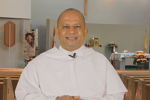Pastor's Corner - Dec, 17th 2023
The third Sunday of Advent is called Gaudete Sunday, and holds a significant place in the liturgical calendar, marking a joyful midpoint in the season of anticipation before Christmas. The term "Gaudete" is derived from the Latin word for "rejoice," taken from the entrance antiphon for the day, which begins with the words "Gaudete in Domino semper" or "Rejoice in the Lord always."
The history of Gaudete Sunday is deeply rooted in Christian tradition. The observance dates back to the medieval period when the church recognized the need to balance the penitential nature of Advent with moments of joy and hope. The third Sunday of Advent serves as a brief respite from the more somber aspects of the season, allowing believers to rejoice in the imminent arrival of the Christ child.
The liturgical color for Gaudete Sunday is rose or pink, symbolizing joy and a departure from the traditional purple associated with penance and preparation. This distinctive color choice is a visual cue to the faithful that a shift toward celebration and gladness is underway.
In the gospel of this Sunday once again John the Baptist is presented as the one who came to prepare the way for the Lord Jesus Christ. John was largely successful in preparing others to receive Christ because he was well prepared himself.
His birth was well planned and prepared by God.
John’s conception and birth were to be so special that his mother’s womb remained barren until God decided to bring John into the world. He was destined to carry out a special mission, John was conceived when his parents (Zechariah and Elizabeth) least expected it (Luke 1:5-25). Another point indicating that God prepared the Baptist is the fact that it was the angel Gabriel who announced the name ‘John’ – a name unusual in his family – even before he was born (Luke 1:13, 60-61).
His birth was well prepared by his parents.
We can sum up how Zechariah and Elizabeth prepared John as follows:
* They ensured that the name given by the angel was given to their child.
* They nurtured John to appreciate the unique circumstances of his birth as well as the divine mission entrusted to him.
* They trained him to know the scriptures, to be submissive to the Spirit of God, and to be committed to his mission.
Like Zechariah and Elizabeth who prepared John for his mission, all parents have the duty to prepare their children for their missions. Like Zechariah and Elizabeth, parents have to bring up their children to know, love and serve God. Secondly, through ensuring that their children have a sound education, paying close attention to their well-being and interests, and helping them identify their talents, parents play their due role in preparing their children for their future mission of contributing to society, to the glory of God.
John prepared himself personally.
John went to the desert to prepare himself through prayer, fasting, and other forms of asceticism. By so doing he submitted himself to the Spirit of God (Luke 1:80). Secondly, he led a simple life, dressing and the type of food he ate. Thirdly, no strong drink ever touched his lips and no razor touched his hair, in accordance with the angelic message.
Conclusion
Through the intercession of John the Baptist,
* May we appreciate ever more God’s investment in us;
* May every parent be more responsible for his/ her child’s good upbringing and solid preparation for the future; and
* May we be constantly committed to fulfilling our general and specific missions.
